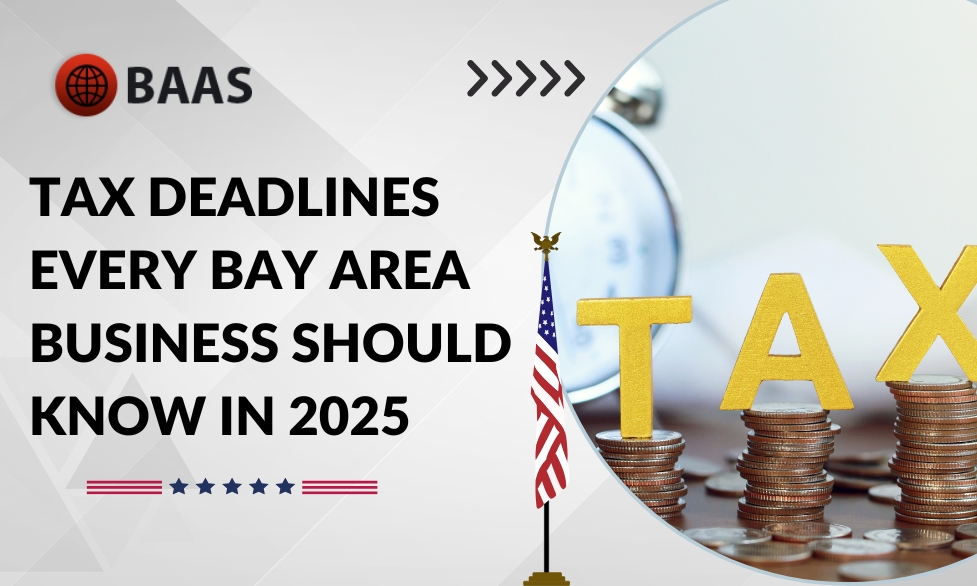Tax Deadlines Every Bay Area Business Should Know in 2025
Running a business in the Bay Area comes with many opportunities — but it also requires staying on top of tax obligations. Missing deadlines can result in penalties, interest, or even legal issues, which can disrupt your operations and growth.
This guide outlines the most important Tax Deadlines for Bay Area Businesses in 2025, including federal and California-specific requirements, so you can stay compliant and avoid unnecessary stress.
Why Bay Area Businesses Must Track Tax Deadlines
The Bay Area has a diverse business ecosystem with varying tax obligations, depending on your structure — LLC, corporation, or sole proprietorship. Timely filings ensure:
- Avoidance of late fees and penalties
- Accurate reporting to federal and state authorities
- Maintenance of good standing for investors, banks, and partners
Pro Tip: Keep a calendar of deadlines and set reminders to prepare all required documents in advance.
Key Tax Deadlines for 2025
January 15, 2025
- Estimated Taxes: Final estimated tax payment for 2024 due for individuals and businesses that pay quarterly.
April 15, 2025
- Individual Income Tax: Federal and California personal income tax returns due (Form 1040).
- LLCs: Annual $800 franchise tax due for all California LLCs.
- Corporations: Minimum $800 franchise tax due.
- First Quarter Estimated Taxes: Due for individuals and businesses paying quarterly.
June 15, 2025
- Second Quarter Estimated Taxes: Due for individuals and businesses.
September 15, 2025
- Third Quarter Estimated Taxes: Due for individuals and businesses.
October 15, 2025
- Extended Individual Tax Returns: Deadline for filing federal and California personal tax returns if an extension was filed.
January 15, 2026
- Fourth Quarter Estimated Taxes: Due for individuals and businesses.
Additional California-Specific Deadlines
- LLC Annual Fee: Pay any LLC fee based on total income from California sources by the 15th day of the 6th month of your tax year.
- Corporate Filings: Corporations must file Form 100 or 100W depending on classification, by the 15th day of the 4th month after the close of their tax year.
- Sales Tax Returns: Depending on your filing frequency (monthly, quarterly, or annually), California sales tax returns are due on specific dates throughout the year.
Pro Tip: Use cloud-based accounting software to track deadlines, generate reports, and calculate estimated tax payments.
How to Stay Compliant
- Work with a CPA: Local professionals understand California tax rules and Bay Area-specific regulations.
- Schedule Reminders: Mark your calendar for quarterly and annual deadlines.
- Maintain Accurate Records: Keep invoices, receipts, and payroll records organized for smooth reporting.
- Plan for Estimated Taxes: Avoid last-minute payments and penalties by setting aside funds regularly.
Why Bay Area Businesses Trust BAAS
At Bay Area Accounting Solutions, we help businesses in San Francisco, Oakland, Fremont, and surrounding areas manage tax obligations efficiently. Our services include:
- Tax preparation and filing (federal and California)
- Estimated tax planning and payment guidance
- Bookkeeping and financial reporting
- Payroll management and compliance support
Partnering with BAAS ensures your business meets every deadline while you focus on growth.
Conclusion
Staying on top of tax deadlines in 2025 is critical for Bay Area businesses to avoid penalties, maintain compliance, and plan for growth. By keeping organized, tracking deadlines, and leveraging professional expertise, you can focus on what matters most: running and scaling your business.
Ready to simplify your business tax compliance in the Bay Area? Partner with Bay Area Accounting Solutions today and never miss a deadline again.
FAQ — Tax Deadlines for Bay Area Businesses
Q1: Do all Bay Area businesses pay franchise tax?
Yes. LLCs and corporations operating in California generally owe annual franchise tax, even if there is no profit.
Q2: Are estimated taxes required?
Yes. Freelancers, LLC owners, and corporations paying quarterly estimated taxes must submit payments to avoid penalties.
Q3: Can I file an extension for my taxes?
Yes, California and federal extensions are available, but taxes owed are still due by the original deadline.
Q4: How do I know which sales tax deadlines apply to me?
It depends on your filing frequency, which is based on your total taxable sales in California.
Q5: Should I hire a professional to track these deadlines?
Absolutely. A CPA or local accounting service ensures compliance, avoids mistakes, and provides strategic tax planning.



